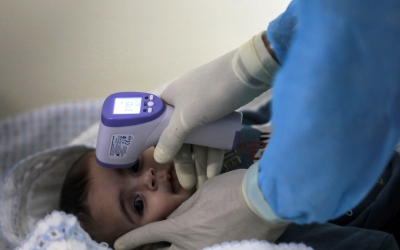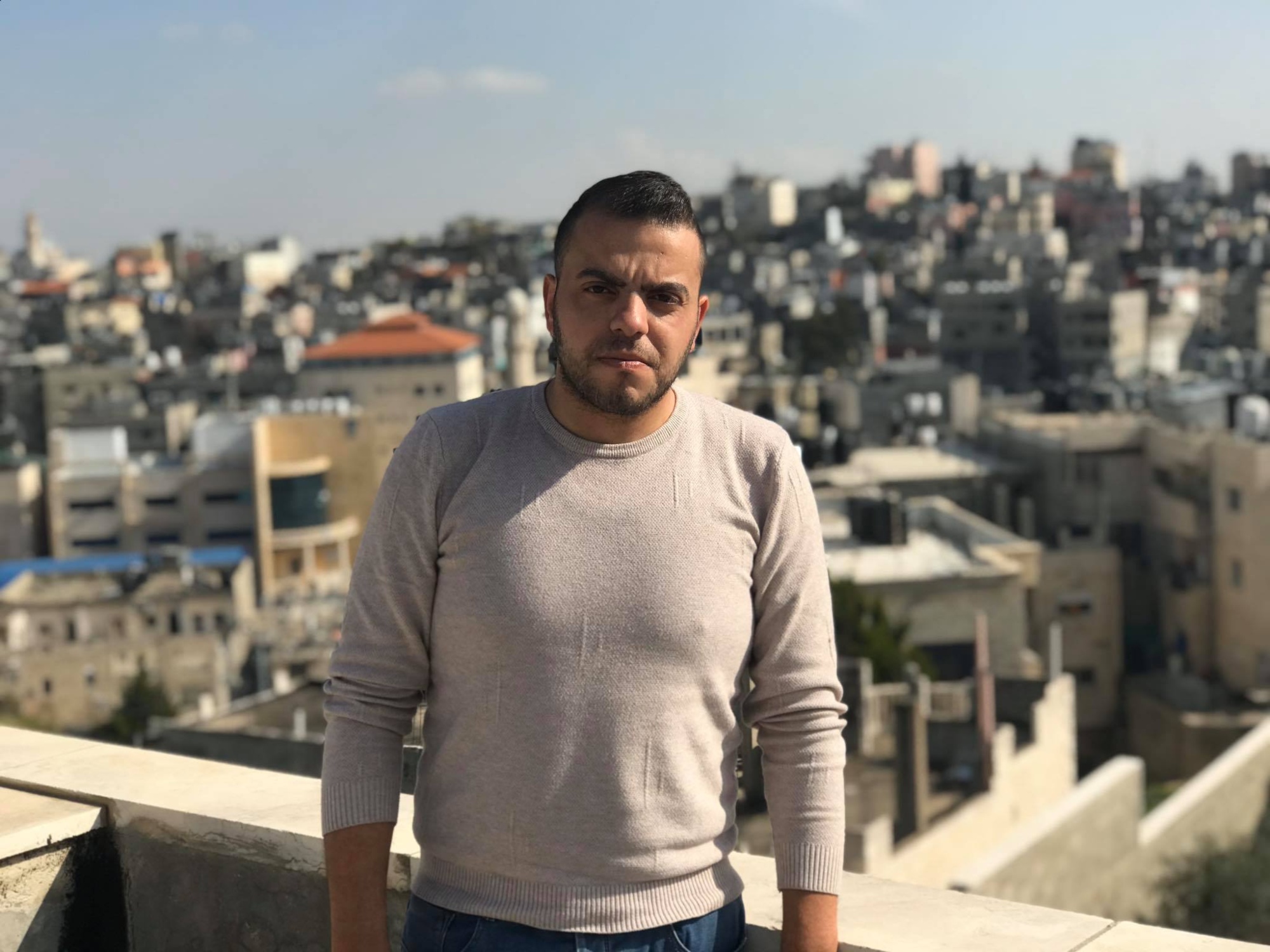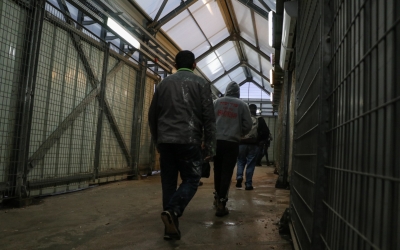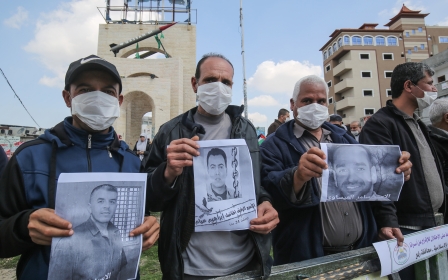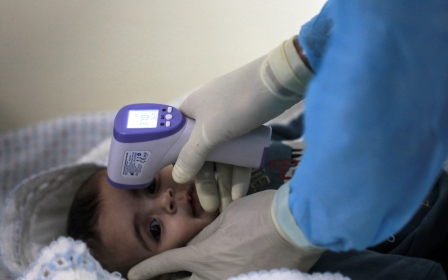Coronavirus: Palestinian workers left in the lurch as Israel reneges on containment plan
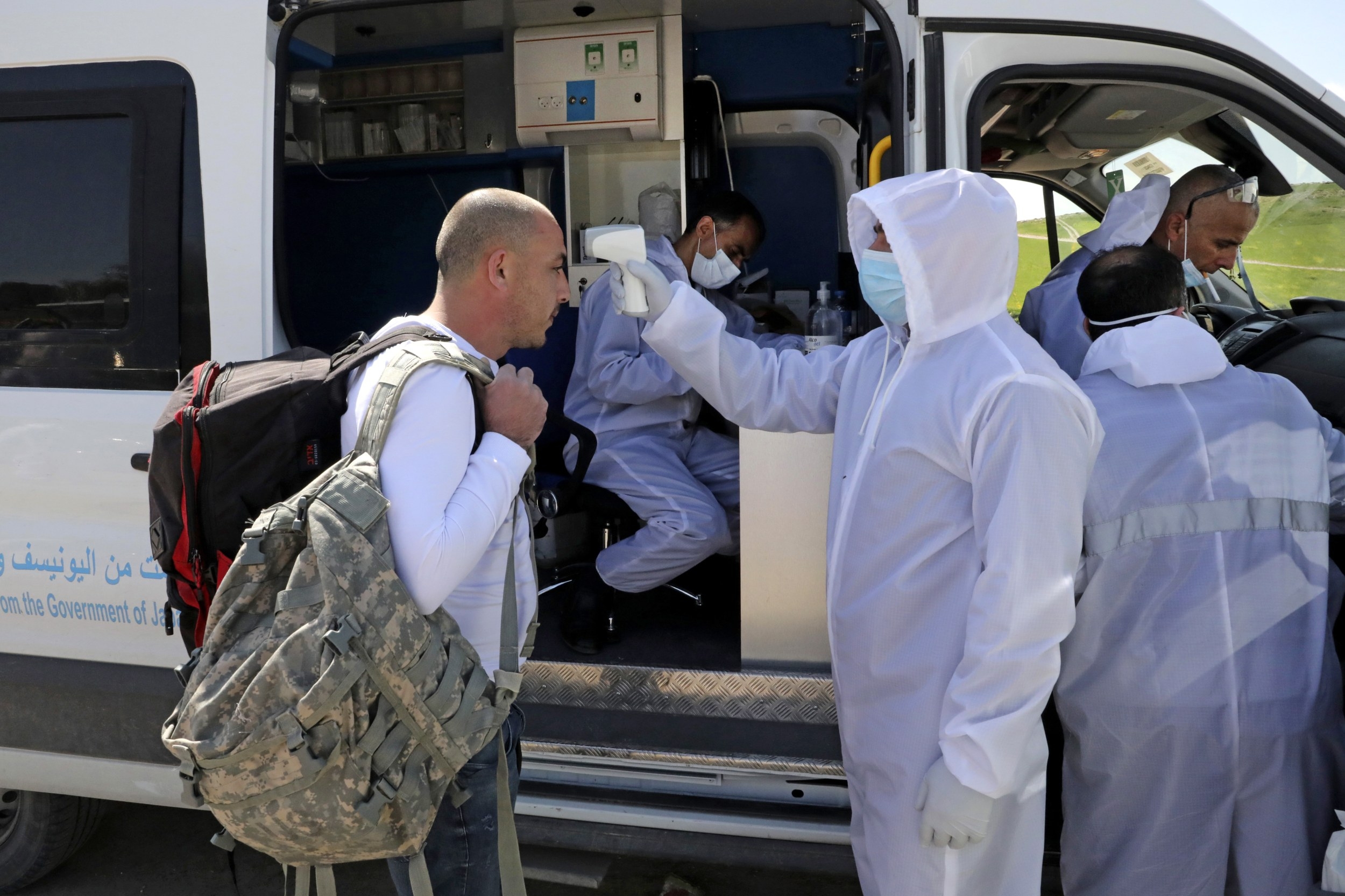
Palestinian labourers are returning back to the occupied West Bank from Israel after several cases of sick labourers being dumped at checkpoints along the Green Line sparked outrage among Palestinians.
Over the past few days, a number of Palestinian labourers who work inside Israel have been dropped off at checkpoints between Israel and the northern West Bank after displaying symptoms of the novel coronavirus - also known as Covid-19.
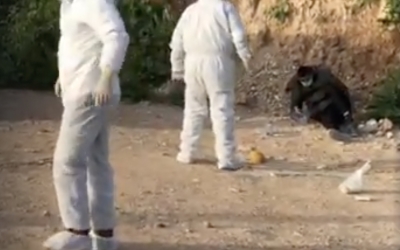
New MEE newsletter: Jerusalem Dispatch
Sign up to get the latest insights and analysis on Israel-Palestine, alongside Turkey Unpacked and other MEE newsletters
Video footage of a sickly, incapacitated worker lying on the ground for hours outside a Ramallah-area checkpoint after being dumped there by Israeli authorities went viral earlier this week, calling into question Israel’s treatment of Palestinian labourers.
Now, the Palestinian Authority (PA) is ordering all its citizens who work in Israel to come back to the West Bank and enter a mandatory 14-day quarantine, or risk facing unspecified penalties from the government.
"In light of the serious and successive developments in Israel, and the expected movement restrictions, we ask all Palestinian workers to return to their homes in order to protect them and preserve their safety,” PA Prime Minister Mohammad Shtayyeh said in a statement on Tuesday.
Last Thursday, Shtayyeh announced that Palestinians were now also barred from working in illegal Israeli settlements in the occupied territory.
The move comes just days after thousands of workers hurried into Israel on the promise that they would be given proper accommodation by their employers and would be allowed to stay within Israeli overnight, in order to avoid the spread of the virus in the West Bank - an opportunity for countless workers to provide for their families amid heightened unemployment during the pandemic.
But as workers continue to turn up at checkpoints with high fevers and other symptoms, often dumped their by their employer or Israeli authorities, it seems that the cost of working in Israel has become much too high for Palestinian labourers.
Disturbing pattern
At least four incidents of Palestinian labourers being dropped at checkpoints by Israeli forces have surfaced in the last few days.
On Monday, eyewitness Ibrahim Abu Safiya from the Ramallah-area village of Beit Sira told Middle East Eye that he saw a Palestinian labourer, later identified as Malek Jayousi, lying on the ground outside of the local checkpoint with a high fever and trouble breathing.
Abu Safiya claimed that one day earlier, another labourer from the al-Jalazun refugee camp in the Ramallah governorate had also turned up at the Beit Sira checkpoint with a high fever, after his employer kicked him out of his job in Israel.
The man, who was allegedly refused medical treatment in Israel, travelled to the checkpoint alone via taxi before being transferred to Ramallah in an ambulance.
On Tuesday night, local media reported that three labourers were dropped off by Israeli authorities at a checkpoint outside Tulkarem, while another was dropped outside the Jbara checkpoint near Hizma, in the central West Bank.
Reports indicated that several of the workers were symptomatic, with high fevers, some over 40 degrees. All the workers were reportedly tested for the coronavirus by local Palestinian medics and ordered into isolation.
PA spokesman Ibrahim Melhem condemned the Israeli treatment of Palestinian workers as “racist and inhumane”.
"If you have to work for a living, then let it be with dignity, and not in this demeaning manner," he said in a statement, addressing the thousands of labourers in Israel.
Ribal Kurdi, a 29-year-old activist from Bethlehem, told MEE that he was both devastated and outraged when he saw the way workers exhibiting symptoms of illness were being treated by Israeli authorities and employers.
“Israel wanted the workers to come into the country and work,” Kurdi said. “But they didn’t want to be responsible when the workers got sick.
“The Israeli occupation should be responsible for the lives of the Palestinian workers - for their healthcare, accommodation, everything,” he said.
‘Employers have given us nothing’
According to rights groups, last week’s decision to allow workers to sleep in Israel - a change from usual work permit policy - for an extended period of time in order to prevent further spread of Covid-19 was flawed from the start.
Kav LaOved, an Israeli workers’ rights group, said in a statement on Facebook on 18 March that “unfortunately, the majority of Israeli operators did not fulfil the commitments they made to provide proper and healthy accommodation for workers”.
Alongside photos of hundreds of workers stuck at an unidentified checkpoint, the group also claimed that no measures were taken to “provide health protection in case a worker is exposed” to the coronavirus.
According to Kav LaOved, approximately 60,000 Palestinians work in Israel, primarily in construction and agriculture. Another 30,000 are estimated to work in Israeli settlements across the West Bank.
The group, along with the Association for Civil Rights in Israel (ACRI) and Physicians for Human Rights–Israel, demanded that Israeli government - specifically Defence Minister Naftali Bennett, who approved the entry of the labourers - to protect the rights of Palestinian labourers during the pandemic.
“We contacted the ministries of labour, security, and health to demand government oversight of these workers' employment and their stay here, and to safeguard their rights. We specifically called for bearable accommodation and health care,” a spokesperson for ACRI told MEE.
But so far, the efforts by such groups seem to be futile.
One worker who was sleeping in Israel, who asked to be identified only as A, told MEE that he and his fellow workers were forced to sleep on cardboard sheets at the construction site where they worked, and were not provided with any hygiene products like gloves, masks or hand sanitiser.
'Our employers have given us nothing'
- A, Palestinian labourer in Israel
“This is much different than what we were told we were getting into,” A told MEE.
“Our employers have given us nothing, and if you get sick, they will just send you back without any treatment.”
On Wednesday, the number of confirmed coronavirus cases in Palestine went up to 62 - in contrast with more than 2,100 confirmed cases in Israel.
Wafa, the official news agency of the PA, reported that one of the new confirmed cases, a woman in her 60s from the village of Biddu near Ramallah, “may have contracted the disease from her sons who work in Israel”.
Kurdi insisted that it was not the fault of labourers for going inside Israel to work, saying “they had to choose between feeding their families or getting sick”.
“This is a miserable situation,” he told MEE.
At the end of the day, he said, it’s the “Israeli occupation which is responsible for now endangering the health of the entire West Bank”.
This article is available in French on Middle East Eye French edition.
Middle East Eye delivers independent and unrivalled coverage and analysis of the Middle East, North Africa and beyond. To learn more about republishing this content and the associated fees, please fill out this form. More about MEE can be found here.


